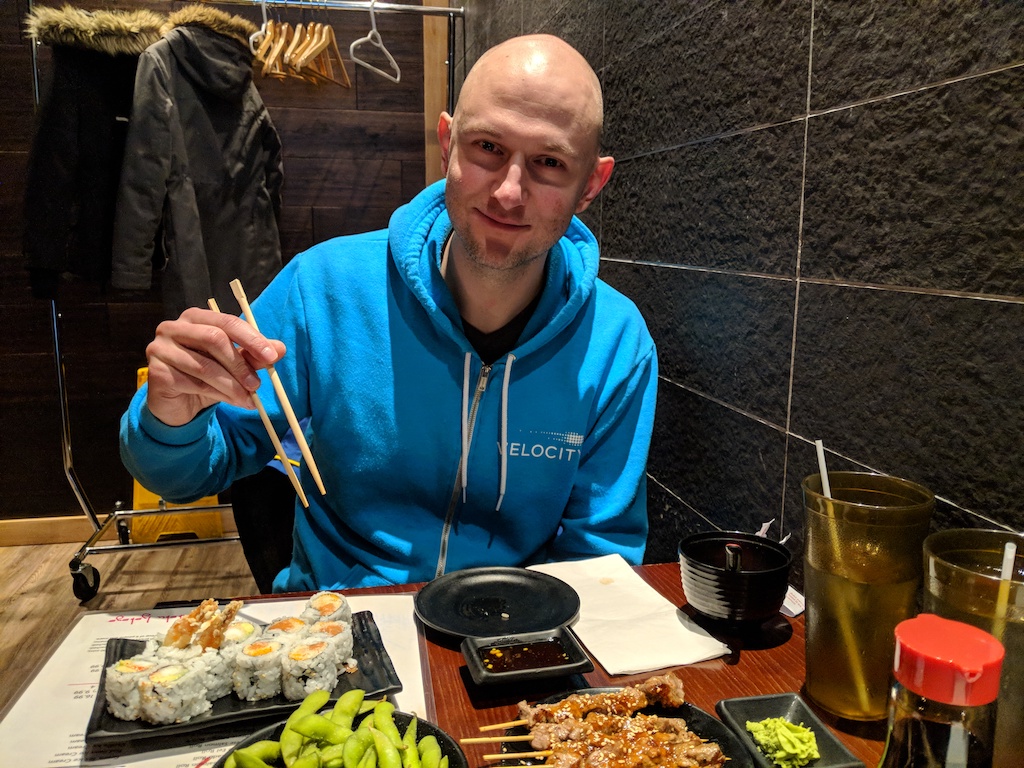For my inaugural episode of Lunch’Ed, I sat down to talk with my former Postmedia Digital Innovation teammate, Steve Veerman. Steve chose to eat at Kinkaku Izakaya in Kitchener and selected various tasty dishes for us to share.
I love this story, as I find it very inspiring. Not only is Steve scratching his entrepreneurial itch, but he’s also helping to make the world a better place in the process.
Steve joined Postmedia back in 2009 and eventually leaped with me to start the Digital Innovation team. In 2012 Steve departed to continue his education at the University of Waterloo, completing his Master’s Degree in Business, Entrepreneurship and Technology.
I don’t get out to the Kitchener-Waterloo area often, but I always enjoy it when I do. There is a great vibe here that I can only assume is comparable to Silicon Valley. It’s full of young, vibrant and optimistic people looking to make their mark on the world. As we started our discussion, Steve brought some insight into the impact that Blackberry has had on the area and the silver lining to the near collapse of RIM.
“This is the place to be. There were so many offshoots of Blackberry that resulted in other startups. They were the seed in this ecosystem that allowed a lot of things to grow. Maybe it was a good thing [Blackberry] imploded. How many people would have stayed there and not left to do other, better, things?”
One of those great ideas springing forth is HITCH. HITCH is a hardware device, a smart router with video caching designed for developing countries with unreliable power and networking grids.
Steve met his co-founder Uche in the MBET program. Uche came to Waterloo from Nigeria where he worked with the Ministry of Agricultural consulting on their web portal. The problem he faced was that the farmers, while they have phones, they couldn’t access the portal because they live in areas without access to the internet. What he wanted to do was build smart routers that cache content and deliver it that way.
Steve at the time was looking to find a partner who was just crazy in love with an idea and would just pursue it with everything. He heard about Uche’s idea and more than anything fell in love with his passion for it. So they got together and set about this journey to tackle the problem.
What they soon discovered was that the sales cycle was too long. They had one buyer, the Nigerian government. The government was cool with paying for the website but trying to get them to commit to buying a certain number of devices wasn’t going to happen anytime soon. So in September, they decided to pivot and target private schools in Nigeria. The private schools outnumber public schools and are run as individual businesses. Instead of one buyer they now have thousands of potential buyers.
“[The children] come to school, a lot of them have phones and tablets but they don’t have internet access. Nigeria doesn’t have wires in the ground, so all their internet infrastructure is built on 3G.”
They identified schools where the children are equipped with devices and no internet, and then took their curriculum and mapped it to videos which they then uploaded to HITCH. Students can connect to HITCH, download videos, and watch the content at home or their leisure for homework. “It is a way to make delivery of video more affordable.”
They have signed up some paying customers and are now in the midst of rolling out the project this month. Uche and newcomer Brad are in Nigeria this month deploying to the selected schools, and they have more schools interested. “I think if we can get to a few more schools, we can all pay ourselves and we are all happy.”
Discussing some of the challenges he’s facing, Steve highlights the pressure of being the only developer in a small startup.
“At the end of the day, I feel a lot of pressure to get it done. I’m the only software guy on the team. Sometimes I wish I had a larger team. I like the co-ops, but they come and go. I want to be able to work with people who know things I don’t know.”
Being a bootstrapped company comes with some additional pressure, and I asked Steve how he removes the distraction of taking on paying side gigs to keep things going. He responds by confirming that he is all in. It’s his full-time thing, and he’s not working on anything else.
“I say no to everything, but I feel like an idiot half the time. No, make that most of the time. Why am I saying no to that job again? It’s guaranteed X amount of dollars, and it sounds very tempting. “
While at times he may second-guess himself, he still believes he’s doing the right thing.
“I think it’s worth taking the chance.”
I couldn’t agree more Steve. I believe you are on the verge of something great.

